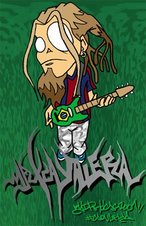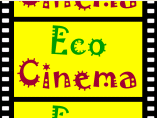
Cement Octopus
There's a cement octopus sits in Sacramento, I think,
Gets red tape to eat, gasoline taxes to drin,
And it grows by day and it grows by night
And it rolls over everything in sight.
Oh, stand by me and protect that tree
From the freeway misery.
Who knows how the monster started to grow that way;
Its parents are frightened and wish it would go away.
But the taxes keep coming, they have to be spent
On big bull dozers and tanks of cement,
Oh, stand by me and protect that tree
From the freeway misery.
That octopus grows like a science-fiction blight,
The Bay and the Ferry building are out of sight,
The trees that stood for a thousand years,
We watch them falling through our tears
Oh, stand by me and protect that tree
From the freeway misery.
Dear old MacLaren won't take this lying down,
We can hear his spirit move in the sandy ground,
We built this Eden on the duney plain,
Now they're making it a concrete desert again,
Oh, stand by me and protect that tree
From the freeway misery.
The men on the highways need those jobs, we know
Lets put them to work planting new trees to grow.
Building new parks where kids can play,
Pushing that cement monster away,
Oh, stand by me and protect that tree
From the freeway misery
A great poetic song, about the unstoppable expansion of cemented cities, real monster which expands its tentacles and eliminating forests, trees, etc and creates a hostile and stressing environment where kids have no place to have fun. It is also refers to economical purposes that leads to such condition. The taxes from traffic must be used not for support of traffic but for more green and recreation areas in the grey cities. The original song was wriiten and sung in 1964 by another old singer-political activist Malvina Reynolds at a rally in Golden Gate Park to save the area from a proposed freeway (which was not built). http://www.wku.edu/~smithch/MALVINA/mr024.htm
God bless the grass
God bless the grass that grows through the crack.
They roll the concrete over it to try and keep it back.
The concrete gets tired of what it has to do,
It breaks and it buckles and the grass grows thru,
And God bless the grass.
God bless the truth that fights toward the sun,
They roll the lies over it and think that it is done
It moves through the ground and reaches for the air,
And after a while it is growing everywhere,
And God bless the grass.
God bless the grass that breaks through cement,
It's green and its tender and it's easily bent,
But after a while it lifts up its head,
For the grass is living and the stone is dead.
And God bless the grass.
God bless the grass that's gentle and low
Its roots they are deep and its will is to grow.
And God bless the truth, the friend of the poor,
And the wild grass growing at the poor man's door,
And God bless the grass
A song that refers to the strength of the simple and small grass that in the end winns the cement. It can be a metaphor for any kind of silent and non violent revolution that slowly but steadily replaces old repressing institutions and outdated attitudes that seems to be powerful and steady as cement. This song has also been written and sung by Malvina Reynolds
My Dirty Stream (The Hudson River Song)
Sailing down my dirty stream
Still I love it and I'll keep the dream
That some day though maybe not this year
My Hudson River will once again run clear.
It starts high in the mountains of the North
Crystal clear and icy trickles forth
With just a few floating wrappers of chewing gum
Dropped by some hikers to warn of things to come.
At Glens Falls, five thousand honest hands
Work at the Consolidated Paper Plant
Five million gallons of waste a day
Why should we do it any other way?
Down the valley one million toilet chains
Find my Hudson so convenient place to drain
And each little city says, "Who, me?
Do you think that sewage plants come free?"
In the great ocean they say the water's clear
But I live at Beacon pier here
Half way between the mountains and sea
Tacking back and forth, this thought returns to me
Sailing up my dirty stream
Still I love it and I'll dream
That some day though maybe not this year
Yes, my Hudson and my country will run clear.
A wish for a polluted river (Hudson in New York) to become again clean. We read in wikipedia about this political and environmental activist-singer:
Seeger is involved in the environmental organization Hudson River Sloop Clearwater, which he co-founded in 1966. This organization has worked since then to highlight pollution in the Hudson River and worked to clean it. As part of that effort, the sloop Clearwater was launched in 1969 with its inaugural sail down from Maine to South Street Seaport Museum in New York City, and thence to the Hudson River.[26] The sloop regularly sails the river with volunteer and professional crew members, primarily conducting environmental education programs for school groups. The Great Hudson River Revival (aka Clearwater Festival) is an annual two-day music festival held on the banks of the Hudson at Croton Point Park. This festival grew out of early fundraising concerts arranged by Seeger and friends to raise money to pay for Clearwater's construction.
Seeger wrote and performed "That Lonesome Valley" about the then-polluted Hudson River in 1969, and his band members also wrote and performed songs commemorating the Clearwater
You can hear these songs in youtube:
Cement Octopus
God bless the grass
My Dirty Stream (The Hudson River Song)




2 comments:
We read in the dedicated to Malvina's Reynolds work:
People often think of this ("God bless the Grass") as an ecology song, but Malvina wrote it after reading Mark Lane's book, Rush to Judgment, about the Kennedy assassination.
http://www.wku.edu/%7Esmithch/MALVINA/mr053.htm
We do interprete this song as ecological and refering to the power of non-violence against strong totalitarian authorities and political power. We read in the same site that Malvina do write songs which can be interpreted in various ways, dependind the interests of the listener:
Although her topical attacks (such as the classic 'Little Boxes') are perhaps easiest to appreciate, many of Malvina Reynolds' compositions are exquisitely sensitive and richly allegorical: including a good number that might nominally be considered "children's" songs. Take for example 'Morningtown Ride,' one of the few lullabies ever to become a number one pop hit (in England in 1966, as recorded by The Seekers). One can hardly imagine a setting--a train full of contentedly sleeping children chugging and puffing its way down-coast through the night--that better lends itself to allegorical workings. Although Malvina is on record as saying she composed this song as a comfort to children afraid of being cut off from the world by going to sleep at night, one wonders, with all her other agendas (not to mention her earlier academic interests, including Greek mythology), what else she may have invested, consciously or not, into this scenario. The creative listener, for example, might take the song as a sly jab at organized religion, and its tendency to turn its followers into content, but unquestioning, domesticates. On the other hand, one might conclude she was poking fun at the average citizen, portraying him/her as blindly goal-oriented and insensitive to the richness of the ride itself, so mysteriously interposed among the basic interfaces of time, space, and knowledge. Or again, and were she known to have had any interest in theosophy (she didn't), what better metaphor for the voyage of the soul after death, bound for reincarnation...
http://www.wku.edu/%7Esmithch/MALVINA/homep.htm
Little doubt, the dude is totally just.
Post a Comment